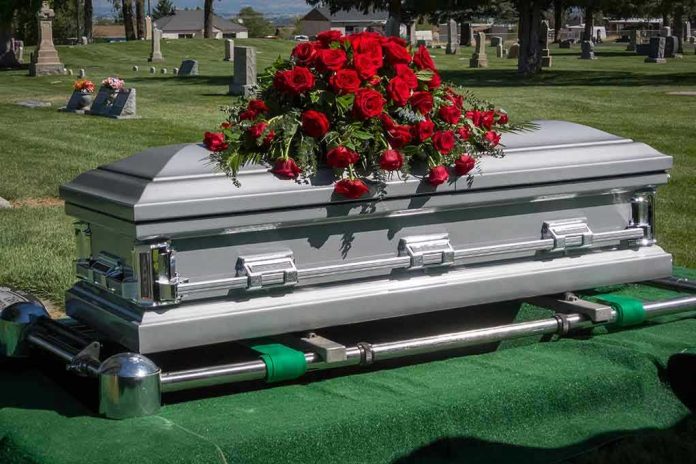
A mother’s worst nightmare became reality when Briauna Morgan was told her infant son died in foster care—yet, months later, the state agency responsible still refuses to give her a straight answer about how or why it happened.
At a Glance
- Person County, North Carolina authorities notified Briauna Morgan that her one-year-old son Kemari died in foster care; the cause remains unexplained.
- Preliminary autopsy found no internal injuries; toxicology results are pending, and authorities maintain strict confidentiality.
- Community outrage is growing amid allegations of unlicensed foster homes and calls for transparency from Child Protective Services.
- The case reignites longstanding concerns about foster care oversight, government accountability, and state overreach into family life.
Mother Gets the Call No Parent Should Ever Receive
On May 24, 2025, Briauna Morgan picked up the phone expecting the usual foster care check-in, only to be told her baby, Kemari, was found unresponsive in his Person County foster home. No parent should live through this. Yet here we are, in the supposed “land of the free,” where big government bureaucrats have the power to snatch your children and then hide behind a wall of silence when tragedy strikes. As if the loss wasn’t enough, Briauna received nothing but vague answers and bureaucratic platitudes from the very agency entrusted with her son’s life.
Authorities told Briauna that preliminary autopsy results showed no internal injuries. That’s it. No explanation, no accountability, just a cold, clinical brush-off. They ordered a toxicology report, but—here’s the kicker—results could take months. Meanwhile, the state apparatus circles its wagons, citing “confidentiality” while a grieving mother is left twisting in the wind. Not one public official has offered a clear timeline or a shred of real compassion. If this isn’t the poster child for government overreach gone wrong, what is?
Community Calls Out Foster Care Failures and State Secrecy
This isn’t some isolated blip. Kemari’s death has ripped the scab off longstanding wounds in North Carolina’s foster care system—especially in Person County. For years, locals have sounded the alarm about unlicensed foster homes and shoddy oversight. Now, those warnings seem almost prophetic. Community advocates, fed up with state-run secrecy, have launched the “Justice for Kemari” campaign, demanding answers and real reform. The chorus is growing: people want to know why a healthy baby could end up dead on the government’s watch, and why the agency responsible won’t face the music.
Person County Social Services, the agency tasked with protecting Kemari, is now under a microscope. Not only did they place him in the foster home, but they’ve also stonewalled the family and public at every turn. The sheriff’s office leads the “ongoing investigation,” but their lips are sealed. No charges, no disciplinary actions, just radio silence while rumors swirl about whether the home was even properly licensed. If the roles were reversed and a parent failed to explain a child’s death, you can bet the government would be knocking down doors. But when it’s the state? Suddenly, due process and privacy matter more than basic decency or accountability.
Broken Trust, Government Overreach, and the Toll on Families
The aftermath of Kemari’s death is more than a family tragedy—it’s a gut punch to anyone who still believes that government should serve the people, not steamroll them. Briauna Morgan’s pain is compounded by a system that treats grieving parents like nuisances and shields itself from scrutiny. The trauma isn’t limited to one family; it’s a chilling warning to every parent in America about what happens when unaccountable bureaucrats get to decide the fate of your children behind closed doors. The Person County case exposes exactly what’s wrong with a bloated, unresponsive welfare state: the state always finds a way to protect itself first, no matter the cost to the individual.
The consequences go beyond this single case. Community trust in child welfare agencies has eroded—maybe for good. More families are hesitant to cooperate with CPS, fearing their children could be lost to a system with no transparency and no remorse. If nothing changes, expect more lawsuits, more costly investigations, and, worst of all, more children put at risk because the government refuses to clean its own house. The “Justice for Kemari” movement is a warning shot—ignore it at your peril. When government intrudes into family life, fails at its most basic duty, and then refuses accountability, people will fight back.
Experts Warn of Systemic Failures and Urge Accountability
Child welfare experts aren’t mincing words. They have long warned that stuffing kids into unlicensed or poorly supervised foster homes is a recipe for disaster. Social workers and professional organizations are now calling for independent investigations into deaths like Kemari’s—because, let’s face it, the fox shouldn’t guard the henhouse. Legal analysts stress that transparency isn’t just a matter of good governance; it’s a constitutional imperative. Without it, you’re not just risking more tragedies, you’re undermining the very foundation of public trust.
Scholars point to chronic underfunding, sky-high caseworker caseloads, and a culture of secrecy as root causes. The state’s refusal to answer basic questions only strengthens the case for reform. Some voices in the community blame systemic failure, not just a one-off mistake. Others want to wait for the investigation, but how often do those ever end with real accountability? The bottom line: if the state wants the public’s trust, it needs to earn it—starting with honest answers and real oversight, not more bureaucratic cover-ups.
Sources:
Instagram (Justice for Kemari campaign)
Instagram (community advocacy)









